This put up tackles the very thorny subject of selecting between gerunds and to-infinitives. Though there are some guidelines which govern the usage of gerunds and to-infinitives, solely an excessive amount of observe and publicity to English might allow the learner to retrieve the correct kind when they’re the item of a sentence (i.e. observe a predominant verb).
Earlier than I discover the variations between gerunds and to-infinitives, I’ll to start with outline what they’re.
What’s a Gerund?
Gerunds comprise the bottom type of a verb (naked infinitive) adopted by -ing.
Probably the most defining function of gerunds is that they behave fully as nouns, even if they’re derived from verbs.
An instance of a gerund is the phrase biking. Therefore, we will use the phrase biking in a sentence as a noun to check with the act of using a motorbike, as in:
Biking is sweet on your well being
I really like biking
The phrase biking retains its verbal attribute. Nevertheless, the function this gerund performs shifts from describing the motion to being a focus. Basically, biking turns into a factor, in that it may be the topic or direct object of a sentence. However, the buck doesn’t cease with these two sorts of gerunds. Try simply how versatile gerunds are:
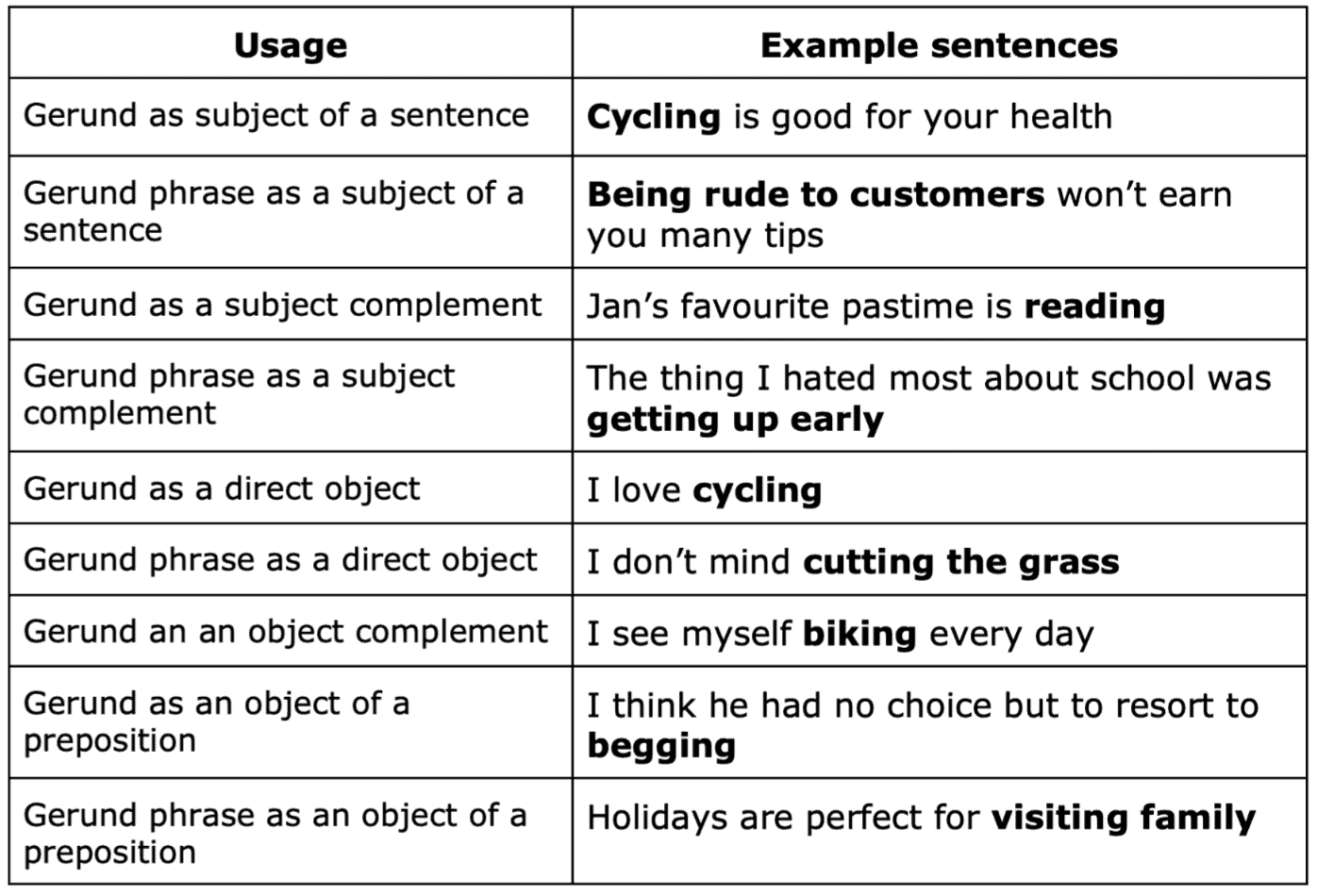
It’s essential that the learner doesn’t confuse gerunds with current participle verbs. Current participle verbs describe the motion in a sentence, as in:
As I used to be strolling to work, I tripped over the kerb and broke my information
I’m sleeping
What’s a to-infinitive?
To-infinitives, often known as full infinitives, are fashioned by taking the bottom kind (naked infinitive) type of a verb and including to in entrance of it.
To-infinitives are utilized in many conditions, together with to point out intention and after relative pronouns, resembling how and what.
The to-infinitive within the following sentence acts as an adverb (of objective) to explain the principle verb:
Mum simply left to purchase some bread
Paving the way in which to selecting between gerunds and to-infinitives
Deciding on whether or not to make use of a gerund or to-infinitive may be exceptionally troublesome for learners of English. It is because there are such a lot of verbs which might co-occur with each types, relying on the context after all.
Parrott (2000: 170) factors out that it is exhausting to select between a to-infinitive or gerund as a result of the “guidelines which information us could seem arbitrary to learners.”
With Parrott’s (ibid.) level in thoughts, I’ll now reveal a few of the most defining options of gerunds and to-infinitives. I’m able to do that as a result of I’ve researched how each authors of generic grammar guides and specialists on infinitive and -ing clauses usually distinguish between the 2 types.
1. The ahead and backward-looking qualities to-infinitive and -ing types
Two authors who describe what a to-infinitive and an -ing kind have a tendency to precise are Parrott (2000) and Shut (1992).
To start with, each authors concur {that a} full infinitive implies trying ahead in a sequence of occasions. To completely admire the dominant forward-looking qualities of the infinitive, one should respect the overall consensus amongst students that the origins of the to of the infinitive derive from the preposition to (Egan, 2008, p.95). Therefore, to is a variant of the preposition and it, subsequently, represents a ‘path in the direction of purpose’ perform. The potentiality of an occasion clearly performs a task right here.
Anyway, if the complete infinitive refers back to the future, or a brand new act in a sequence of occasions, then the -ing ought to logically look “backwards to earlier exercise in progress and even to a earlier act accomplished” (Shut, 1992: 122).
Shut (ibid.) gives three pairs of sentences which capably spotlight how the -ing refers to a course of on which the speaker is trying again. Conversely, the infinitive refers to a brand new (forward-looking) act:
1.
(a) I remembered to phone the physician.
(b) I remembered telephoning the physician.
Right here, (a) means: First I keep in mind what I needed to do, then I referred to as. (b) means: I telephoned the physician, and remembered doing so.
2.
(a) I normally neglect to signal my letters.
(b) I shall always remember seeing Fujiyama by moonlight.
Right here, (a) means that I neglect that I’ve to signal my letters and subsequently don’t signal them. In distinction, (b) means that I shall not neglect an occasion which occurred previously.
3.
(a) I remorse to let you know that I shall be away.
(b) I remorse telling you that I shall be away.
In (a), I first remorse and now I let you know. In (b), I’ve already informed you, and now I remorse it.
Lastly, it’s essential to state that there are many instances whereby the gerund has forward-looking qualities. Aided by the work of Egan (2008), I’ll discover a few of these instances afterward on this put up.
2. Exercise in progress or new act
Shut (1992: 120-21) stresses the purpose that the -ing kind might check with exercise in progress. Quite the opposite, the complete infinitive refers to a brand new act in a sequence of occasions. This distinction, then, is partially associated to the backward-looking/forward-looking variance outlined partially 1 above.
The examples Shut (p.122) gives are:
(a) I like dancing. (= the exercise)
(b) Would you want to bop? (a brand new act)
Nevertheless, it’s additionally attainable to say I like to bop. I’ll go into this distinction between like with -ing and like + to-infinitive in my subsequent put up.
3. Completely different-subject constructions
Because the title suggests, different-subject (DS) constructions include two topics (Egan, 2008: 20). In numerous-subject constructions, the topic of the principle verb (S1) is distinct from the topic of the complement predicate (S2).
Egan (2008: 22-23) proposes six classes of different-subject constructions:
(1) Notion constructions
S1 registers the motion happening. For instance:
You seen me watching you, I shouldn’t surprise …
(2) Psychological Course of constructions
S1 registers the motion happening, considers it and should kind a judgement relating to its existence. As an example:
Most scientists consider the infill to be lava.
(3) Perspective constructions
Right here, S1 registers the motion in progress and formulates an angle in the direction of it. For instance:
I dread mine reaching their teenagers.
(4) Communication constructions
S1 points recommendation to S2 or instructs the onstage S2 to take motion. As an example:
The grasp instructions you to remain.
It’s price noting that, in a minority of communication constructions, the addressee of the communication just isn’t S2.
(5) Enablement constructions
S1 both units the stage for S2’s realisation of the complement clause scenario or assumes the function of a minor character in serving to S2 to grasp it. For instance:
Exterior he allowed her to look at the chicken.
(6) Causation constructions
S1 directs the realisation of the complement clause scenario by S2, who has no unbiased say within the matter. As an example:
He halted, forcing the remainder of the sphere to bunch up behind him.
Beneath is a complete (although not exhaustive) checklist of all the principle verbs coated in Egan’s explicit research belonging to every class for different-subject to-infinitive and -ing constructions. (in Egan, 2008: 25-26):
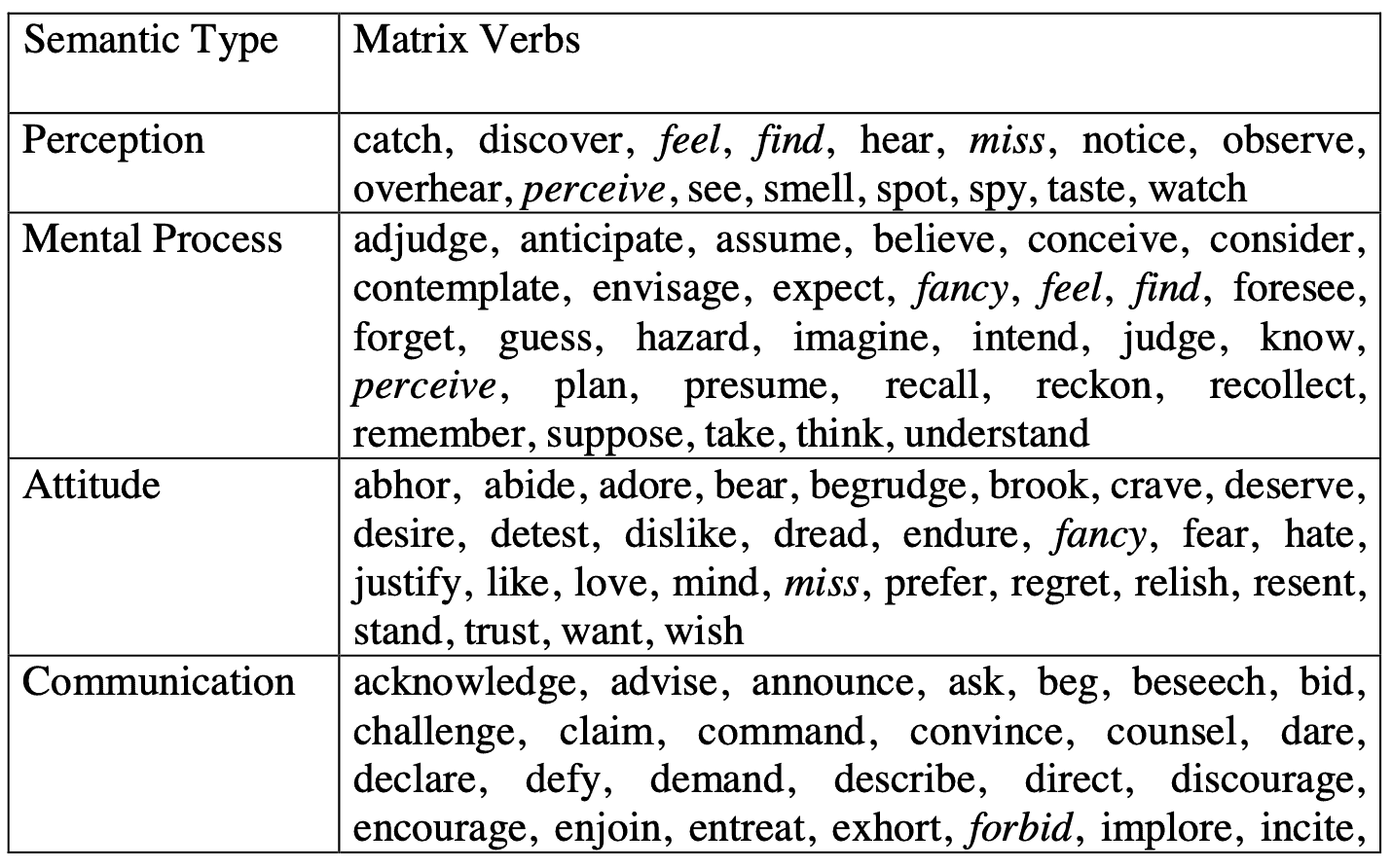
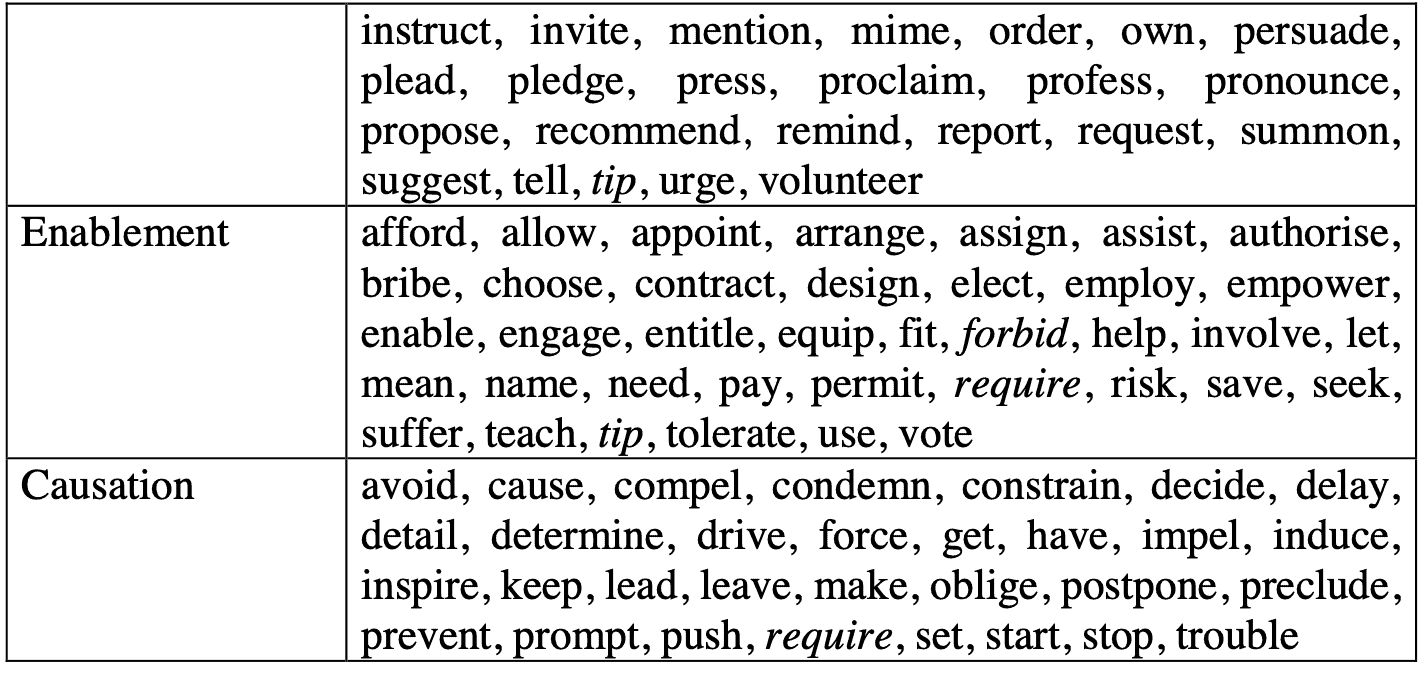
* Verbs listed twice are in italics
4. Identical-subject constructions
Identical-subject (SS) constructions comprise only one topic. Within the following sentence, He is each the topic of vowed and of problem:
He vowed to constantly problem the federal government.
As with different-subject constructions, Egan (2008: 26-27) proposes six classes of same-subject constructions:
(1) Effort constructions
S expends vitality with a purpose to realise a scenario. For instance:
Vietnam would try to attain an early complete political resolution to the battle in Cambodia.
Word: Matrix verbs which fall beneath the class of EFFORT CONSTRUCTIONS overwhelmingly co-occur with to-infinitive types of complementation
(2) Psychological Course of constructions
S considers participating in some kind of scenario. As an example:
For a wild second she contemplated locking the door towards him….
(3) Perspective constructions
S formulates an angle in the direction of a scenario which can probably contain her or him. For instance:
I hate going to the cinema.
(4) Communication constructions
S describes, raises the query of, or expresses an angle relating to, his or her attainable participation in some kind of scenario. For instance:
I agreed to help.
(5) Side constructions
S begins, continues or discontinues his or her participation in a selected scenario. For instance:
They started to ascend the staircase.
(6) Utilized angle constructions
This class accommodates constructions which, to a sure diploma, encompass the traits of each Perspective constructions and of Side constructions. They resemble the latter insofar as they clearly point out whether or not or not the complement scenario was fulfilled; they resemble the previous in that they all the time encode an angle of some kind, both on the a part of the speaker or the topic, to this similar scenario. For instance:
However she condescended to answer.
Beneath is a semantic classification of all the principle verbs coated in Egan’s research which precede same-subject infinitive and -ing clauses (in Egan, 2008: 28-29):
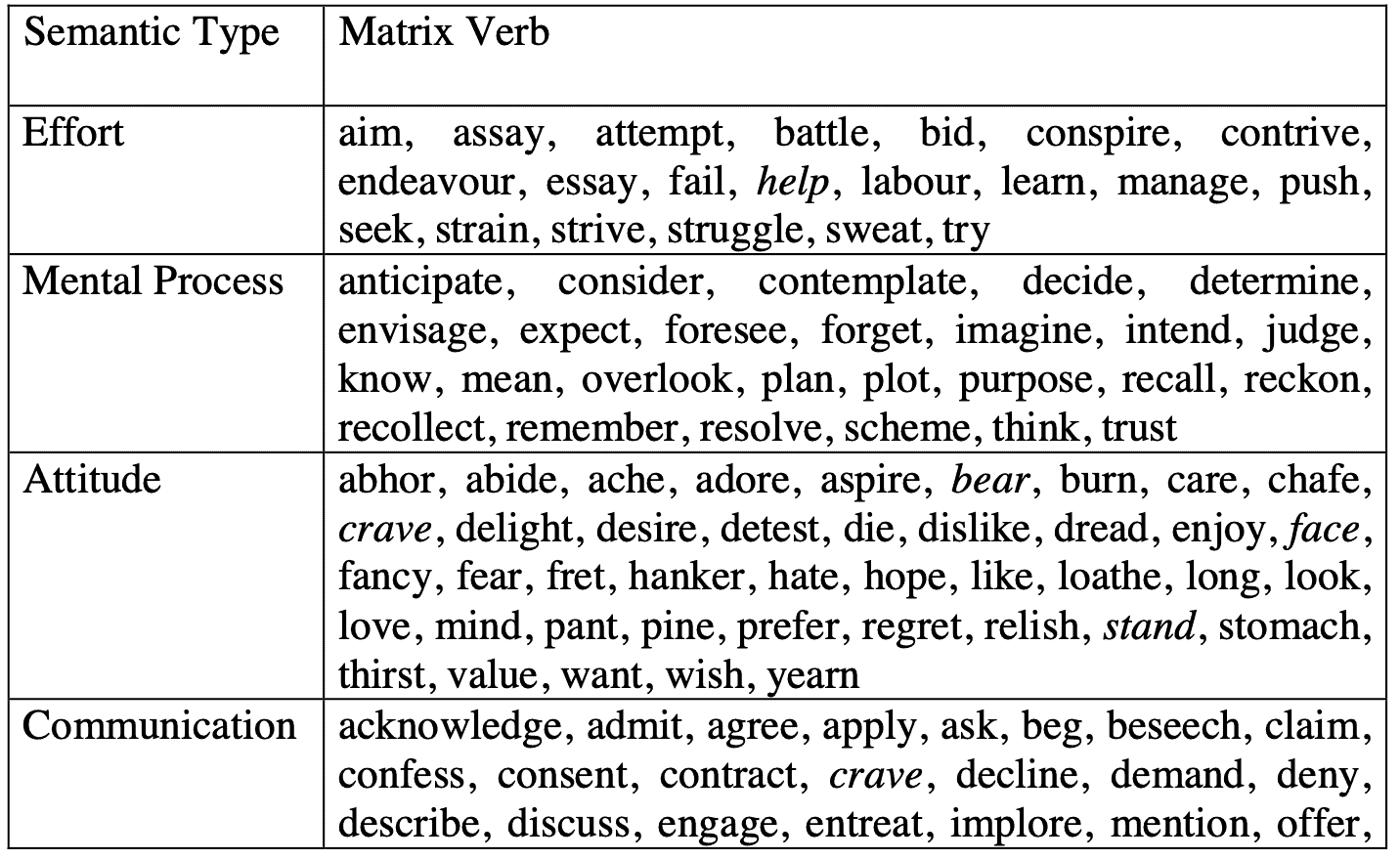
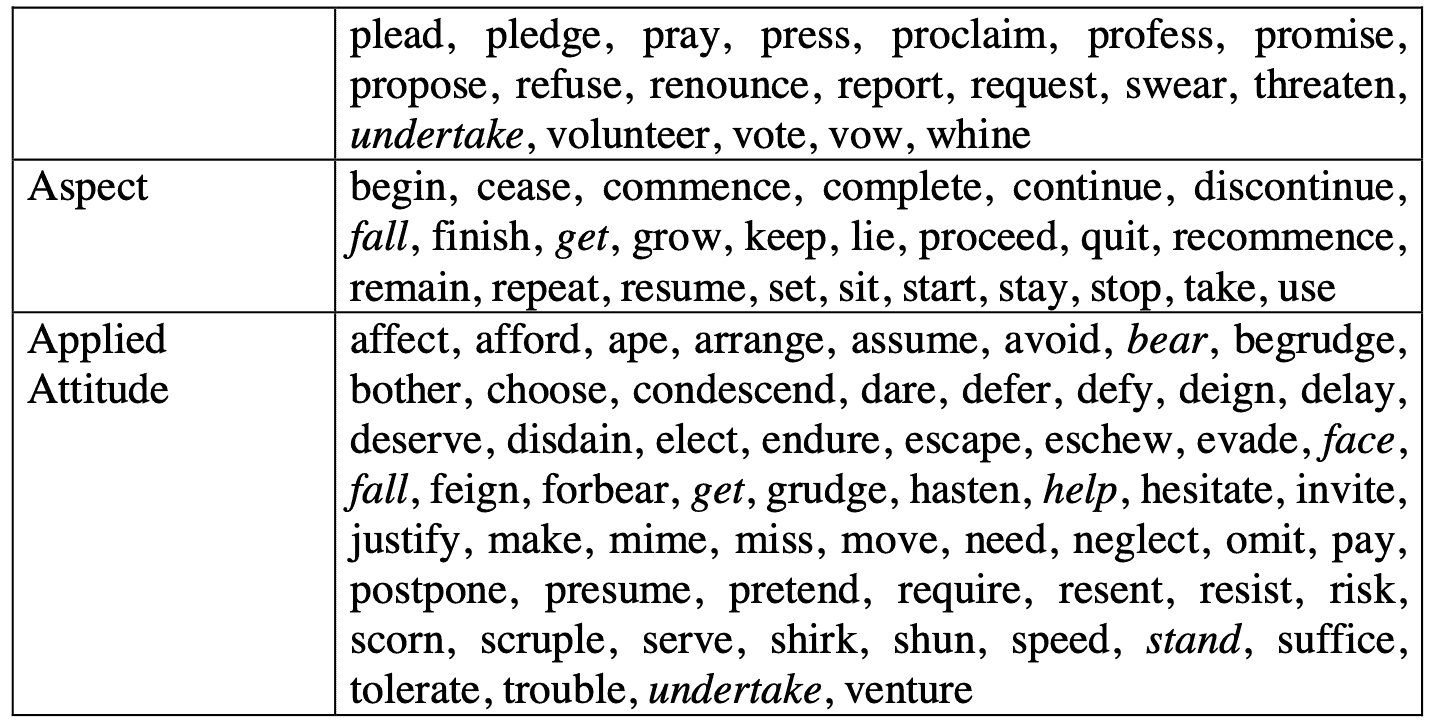
* Verbs listed twice are in italics
Evaluating different-subject and same-subject constructions
For each units of constructions – different-subject and same-subject – Egan (2008: 27) factors out that their constituent classes are usually not watertight. Some predominant verbs take enhances in a number of classes. The verb really feel, for instance, might assume each a perceptive function and that of a psychological course of in relation to different-subject clauses.
5. To-infinitives and Gerunds – Six Forms of Building on the premise of the principle verb and complement scenario
In accordance with Egan (2008: 39-40), there are six kinds of building which emerge from the connection between the principle verb and the complement scenario. You’re already conscious of the forward-looking and backward-looking constructions. Nevertheless, I’ll embody them once more to make this classification scheme full:
(1) Identical-time constructions
With same-time constructions, a scenario happens concurrently with the principle verb. For instance:
I can style blood operating down the again of my throat …
(2) Backward-looking constructions
The scenario is profiled as occurring earlier than the time of the principle verb. As an example:
Adam stopped strolling and stared at her.
(3) Ahead-looking constructions
Right here, the scenario is predicted to happen after the time of the principle verb. For instance:
He then requested Lucy and Jean to return into the kitchen.
(4) Common constructions
A scenario is more likely to happen regularly. For instance:
… God’s personal nation, because the Canadians delight to name it.
(5) Judgement constructions
Whereby a scenario is hypothesised to be true. For instance:
Theodora judged her to be in her early forties …
(6) Contemplation constructions
For instance:
For a wild second she contemplated locking the door towards him …
Feedback
With the three aforementioned classification schemes in thoughts, Egan (2008: 42) neatly summarises the types of complement which happen with varied kinds of predominant verb in each DS and SS constructions in accordance with the connection between the principle verb and the complement scenario:
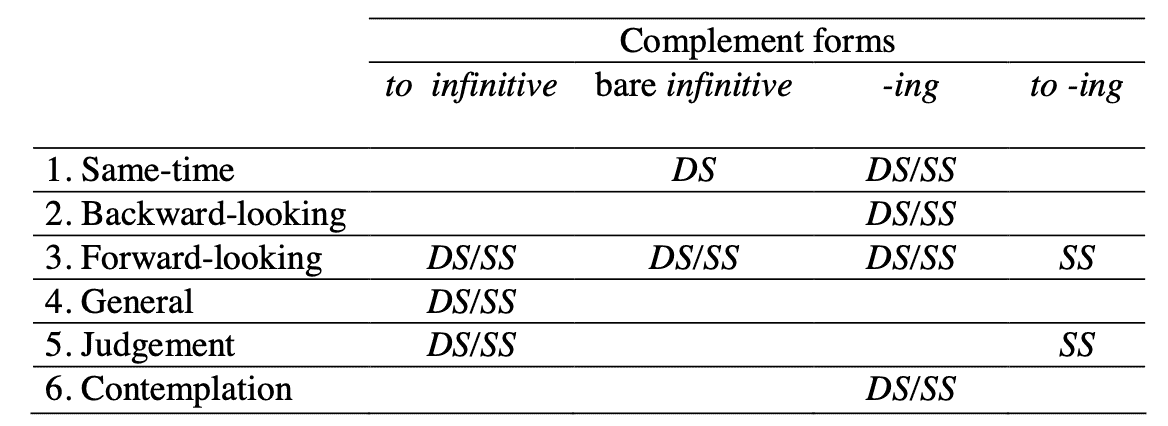
Notably related to the subject of this put up – selecting between gerunds and to-infinitives – Egan (2008: 43) goes one step additional in his subsequent desk. Take into account the variety of constructions in Egan’s research primarily based on the connection between the principle verb and the complement scenario:
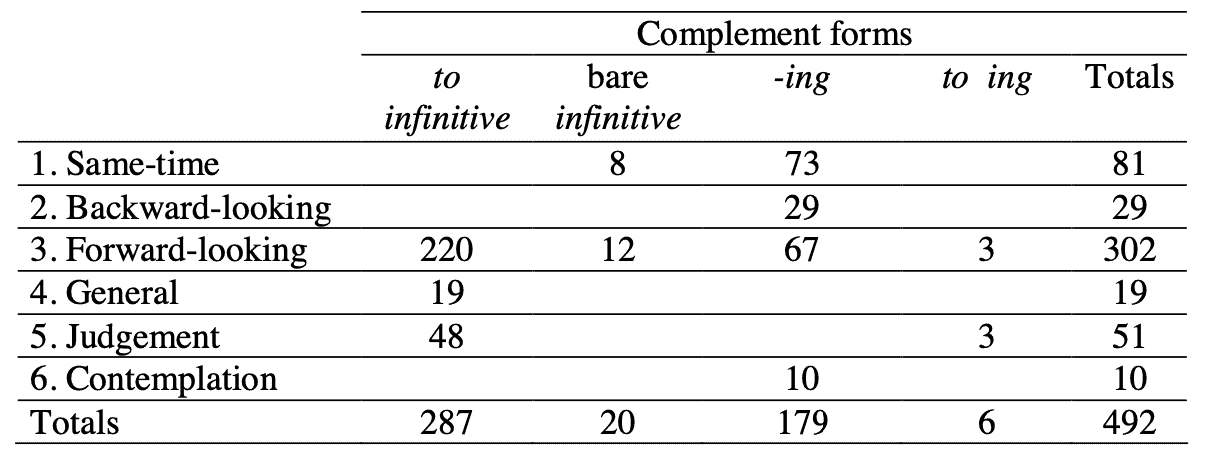
You might draw your personal conclusions from the tables above. Nevertheless, one key remark I’ve is that the -ing kind maybe has extra forward-looking qualities than we’re led to consider by sure authors of grammar guides who write about with gerunds and to-infinitives in a really superficial method.
Matrix verbs which naturally co-occur with to-infinitives and gerunds
Now that we now have established that to-infinitives are firmly related to Ahead-looking, Common and Judgment constructions, I’ll now assess eight verbs which solely, or nearly all the time, co-occur with to-infinitives, and an extra eight verbs which co-occur with gerunds.
The frequency of the assorted constructions relies on projected totals within the British Nationwide Corpus (BNC). Egan (2008) went to nice lengths to incorporate a big database of verbs in Appendix 1 of his e-book. Therefore, the tables I’ll add under are from Egan’s e-book. However, I’ve accessed the BNC with a purpose to extract some instance sentences which include every verb along with a to-infinitive or gerund.
Matrix verbs + to-infinitive
1. advise

advise happens in Ahead-looking Communications constructions.
Instance sentences from the BNC:
I advise you to see your solicitor, she stated
I might advise you to step ahead directly and clarify your self
You have to be cautious of your status. I advise you to maintain him at a distance till you’re married
We might advise you to give us enough discover, normally 12 working days previous to Public sale date
Their accountants suggested them to place additional capital into the enterprise or promote it.
2. afford

afford happens in Ahead-Wanting Utilized Perspective and Enablement constructions.
Instance sentences from the BNC:
We cannot afford to let the Labour Get together go on unopposed
Actually, on this current market, the query is not are you able to afford to put in gasoline central heating. It is are you able to afford to not?
And, fortunately, many can afford to splash out a bit on treats and luxuries
You see, even essentially the most sympathetic of employers might not have the ability to afford to hold on paying you
3. agree

agree happens in a Ahead-looking Communication building.
Instance sentences from the BNC:
I hope the Council will comply with ask the City Clerk to precise concern on the method it is being dealt with
At it is assembly final November, the Coverage Committee did comply with assessment the general spending limits within the mild of the ultimate income Help Declare
It’s an 11-nation membership the place all of the members comply with preserve the worth of their currencies inside fastened bands
The group comply with develop extra collaborative initiatives
4. intention

intention happens in a Ahead-looking Effort building.
Instance sentences from the BNC:
And let’s intention to have that by the top of February
I intention to show that privateness is a factor of the previous, says Dame Edna
This division will intention to encourage non-public sector enterprise in all these fields
We intention to take away all important dereliction from Wales by the top of the brand new Parliament.
5. bribe

bribe happens in a Ahead-looking Enablement building.
Instance sentence from the BNC:
We detest you a lot we’ll bribe you to go away.
6. care

care happens in a Common Perspective building.
Instance sentences from the BNC:
Maybe you’d care to elucidate, Mr Chairman, to those that do not know
for those who would care to face as much as establish your self please
There’s an excessive amount of written proof accessible on the topic for individuals who care to take a deeper look
I might not care to go there as a vacationer within the season of pilgrims
7. select

select happens in Ahead-looking Utilized Perspective and Enablement constructions.
Instance sentences from the BNC:
And naturally we’re providing a service of permitting folks to select to return at 4 somewhat than six
You’ll be able to select to fly again to both Gatwick, Birmingham, Bristol or Manchester
The setting you select to study in performs an important function in how nicely you progress
You might select to set your each day caloric consumption wherever between these two limits
8. count on

count on happens in two Ahead-looking Psychological Course of constructions.
Instance sentences from the BNC:
I half anticipated him to say they stole them from someone’s backyard
He was so candid that, for a second, Kelly anticipated him to disclose that that they had had dinner collectively
You by no means anticipated him to return, did you?
Nevertheless it is not one thing they’re going to count on her to confide even when they learn about it
You’ll be able to’t count on her to get them in on a pupil’s grant
Matrix verbs + gerund
1. foresee

foresee happens in two Ahead-looking Psychological Course of constructions.
Instance sentences from the BNC:
we could not foresee the wagon having two punctures
I did not foresee anybody uncoupling the Lorrimores
By the way, I foresee a serious drawback looming subsequent season
I foresee the photographic work becoming way more mission oriented than it has been
2. justify

justify happens in Identical-time Utilized Perspective and Perspective constructions.
Instance sentences from the BNC:
I imply how are you going to justify speaking to her about that when the effectivity is improved
It could possibly be argued that these provisions would justify permitting any individual to problem workout routines of energy A
I do not actually assume at the moment I might have had sufficient expertise to justify going on the employees
The 200 have to be perceived as a refined automobile, if Rover is to justify charging barely greater than the going charge for its class
How can we probably justify creating 7,000 further kids’s books every year?
3. preserve

preserve happens in Identical-time Side and Ahead-looking Causation constructions.
Instance sentences from the BNC:
An increasing number of proof is piling up towards Sellafield, however they preserve trotting out the identical outdated factor
And so long as medicine keep their stylish picture, kids will preserve falling for them
4. thoughts

thoughts happens in two Identical-time (or Ahead-looking?) Perspective constructions.
Instance sentences from the BNC:
Now for those who two would not thoughts simply transferring again… there… good…
However Elton most likely would not thoughts exchanging his glowing shorts to undergo Adams’ lumberjack shirts if it meant having a track at primary for 16 weeks just like the Canadian rocker did
Diana, Barry’s spouse of 35 years, would not thoughts him assembly all the nice display goddesses
Just a few of them truly requested if I might thoughts having the garments ripped off my again
I do not thoughts speaking about it as a result of it helps me recover from what occurred
5. miss

miss happens in Ahead-looking Utilized Perspective (1) and Notion (2) constructions, and a Identical-time Perspective (3) building.
Instance sentences from the BNC:
However every time I am going dwelling I dangle round and I miss making music one thing terrible
… some policemen additionally speak sadly of how they miss seeing their kids when on nights
6. give up

give up happens in a Backward-looking Side building.
Instance sentences from the BNC:
After that I made a decision to give up working on enamel and begin slicing data as an alternative
Former Jam star Paul Weller has vowed to give up dabbling in politics to spice up his pop profession
She has to give up dwelling previously
7. recall

recall happens in two Backward-looking Psychological Course of constructions.
Instance sentences from the BNC:
I recall seeing the bottom contribution I feel was fifty pence, wasn’t it?
Actually nothing that I recall seeing on account of the intercept ever contradicted that evaluation
Expertise signifies that when buyers lose cash they’re typically unable to recall being warned of the dangers concerned …
8. resist

resist happens in a Ahead-looking Utilized Perspective building.
Instance sentences from the BNC:
However if you’re going around the bend and resist searching for any provide help to are deemed to be completely okay
The Authorities couldn’t resist including offences beneath the Official Secrets and techniques Acts 1911 and 1920
… they may nonetheless resist drawing conclusions concerning the proximity of the mass media to state establishments …
Time Zone additionally normalises your pores and skin so it could possibly resist forming traces and wrinkles for years longer than you’d count on
Two debates related with to-infinitives and gerunds
Selecting between gerunds and to-infinitives turns into an amazing deal trickier when you think about that the to-infinitive just isn’t all the time neatly tied to forward-looking constructions. Furthermore, the gerund just isn’t all the time synonymous with backward-looking constructions.
The intention of this part is to discover these kinds of matrix verbs, to-infinitive types and gerund types which don’t match neatly into the dichotomy of forward-looking and backward-looking constructions.
1. Ought to we solely affiliate ‘futurity’ with the to-infinitive?
In his 2008 e-book, Egan takes a number of authors (resembling Duffley and Bailey, 1992) to job over their perceptions that there’s all the time some aspect of futurity (in relation to the principle verb) concerned in the usage of the to-infinitive.
Egan (2008: 62) highlights the truth that there are two different kinds of to-infinitive complement building which aren’t forward-looking. Let’s very briefly contemplate them:
(a) Judgement Notion / Judgment Psychological Course of constructions
There’s a set of constructions that include to-infinitive types which have doubtful connections with the notion of futurity. We will refer to those as Judgement constructions whereby some scenario is hypothesised to be true.
In Egan’s (2008: 98) phrases, Judgement to-infinitive enhances revolve round “a scenario, seen as a complete, [which] is profiled as more likely to be true.” Judgement constructions encode an opinion concerning the complement scenario. That is both a agency conjecture, as with the ‘know S2 to infinitive’ (see under – 191), or a weaker one, as within the case of the ‘guess S2 to infinitive’ (see under – 192):

In Egan, 2008: 97
Listed below are another illustrative examples of Judgement constructions present in Egan (2008: 94):

In Egan, 2008: 94
Egan (2008: 59) additionally distinguishes between two Judgement ‘‘discover S2 to infinitive’ constructions. These are a Psychological Course of building that means ‘S1 judges S2 to infinitive’ and a Notion building that means ‘S1 discovers S2 to infinitive’. The 2 kinds of constructions are exemplified within the two sentences under, respectively:
1. I discovered them … to be gross with out openness, and crafty with out refinement
2. The exhilaration quickly pale upon checking his gas state, which he discovered to be low
Total, judgement Psychological Course of constructions are way more quite a few than their Notion counterparts. In accordance with Egan (2008: 63), it’s tougher to detect any hint of futurity in Psychological Course of constructions.
(b) Common constructions
The opposite set of constructions which include to-infinitive types and now have unfastened connections with the notion of futurity are what Egan phrases Common constructions. That is when a scenario is more likely to happen on a roughly common foundation.
This sentence (in Egan, 2008: 47) is especially consultant of the Common sort of constructions:
To start with as a result of Italians don’ t prefer to go overseas!
Actually, there’s no trace of futurity on this instance, because it assumes the identical function as the next constructions which clearly happen at common intervals as a result of adverbial often:

In Egan, 2008: 35
Therefore, it’s clear that Common constructions “typically make concrete reference to the events on which one can count on the scenario to be realised” (Egan, 2008: 97). Typical single-word adverbials which counterpoint these constructions are often and usually. Nevertheless, Egan (ibid.) additionally highlights references which take the type of adverbials, resembling once I can, each morning and once we are hungry.
As Egan (2008: 175) places ahead, there are a number of detrimental angle matrix verbs which take to-infinitive enhances and possess Common somewhat than forward-looking traits. These verbs embody bear and stand. Listed below are two instance sentences provided by Egan (2008: 176):
1. ‘Even essentially the most hard-hearted father may hardly bear to have them out of his sight for lengthy.’
2. I can’t stand to see folks being merciless to animals it completely appals me, it does actually, I really feel prefer to take an axe to them
2. To what extent do -ing enhances happen in forward-looking constructions?
Selecting between gerunds and to-infinitives turns into much more difficult when you think about that -ing enhances can even happen in Ahead-looking constructions in addition to their extra acquainted backward-looking contexts. Let’s verify the variety of constructions in Egan’s research as soon as extra for affirmation:

Therefore, Egan centered on a complete of 179 -ing complement types in his research. As many as 77 refer to enhance conditions situated both sooner or later, with regard to the matrix verb, or within the thoughts of the topic.
Egan picks up on the flexibility of the -ing complement (2008: 109). It’s versatile when it comes to each the kinds of predominant verb with which it happens, and the kind of complement scenario it encodes. Certainly, it might encode actions, states (being), accomplishments and achievements.
Relating to the principle matter of this put up – selecting between gerunds and to-infinitives – many -ing enhances with forward-looking qualities specific “close to actuality” (Dirven 1989: 127). The verbs suggest that “an exercise was roughly because of happen, however was simply not realized” (ibid.). Examples of such verbs embody dread, delay, postpone, keep away from, escape and resist. The shortage of realisation related with a majority of these verbs is a far cry from to-infinitives that are extra related to realisation and completion.
Egan (2008: 108-09) shares loads of instance sentences of forward-looking constructions which he situated within the BNC. The principle verbs in these sentences assume varied roles. I’ll solely share the matrix verbs along with the -ing enhances for causes of brevity:
a. … envisage beginning … (Psychological Course of)
b. … dreaded him coming … (Perspective)
c. … talk about transferring the trough … (Communication)
d. … forbids us releasing names … (Enablement)
e. … forestall the crimes being dedicated (Causation)
f. … had delayed telling anybody … (Utilized Perspective)
Lastly, this sentence (in Egan, 2008: 67) is an intriguing one:
I began shedding my hair at twenty 9.
This instance is especially pertinent to the talk of selecting between gerunds and to-infinitives. The -ing kind means that the exercise is a progressive, or durative, ongoing one whereby the hair-loss is gradual. Certainly, one might lose a strand right here, or a strand there. Typically, the exercise of hair-loss shouldn’t be seen as a “homogeneous complete” (Egan, 2008: 67).
Abstract
This put up has proved that it’s no easy job for learners of English to retrieve appropriate -ing or to-infinitive types after each matrix verb they utter.
It’s true that errors in selecting between to-infinitives and -ing types seldom result in essential misunderstandings. Nevertheless, I consider this explicit material just isn’t considered one of Grammar nonsense (to borrow a part of the title of Hugh Dellar and Andrew Walkley’s e-book which I’ve additionally reviewed on this weblog). That’s as a result of making a poor alternative between a to-infinitive and -ing kind might influence on the emphasis a speaker needs to convey with a selected utterance. If the -ing kind performs an attitudinal perform after verbs resembling like and hate, then college students of English ought to try to evoke such applicable emphasis of their utterances.
Lastly, selecting between gerunds and to-infinitives turns into so much simpler when learners take the time to discover corpora. I urge all of my college students to just do that.
References
Shut, R.A. (1992). A Academics’ Grammar: The central issues of English, Hove: Heinle ELT
Dirven, R. (1989), ‘A cognitive perspective on complementation’, in: D. Jaspers, W. Klooster, Y. Putseys, and P. Seuren (eds.), Sentential complementation and the lexicon: research in honour of Wim de Geest. Dordrecht: Foris. 113- 139.
Duffley, P.J. (2004) Verbs of Liking with the Infinitive and the Gerund, English Research, 85:4, 358-380
Egan, T. (2008). Non-finite Complementation: A usage-based research of infinitive and -ing clauses in English, Amsterdam and New York: Rodopi
Parrott, M. (2000). Grammar for English Language Academics, Second Version, Cambridge: Cambridge College Press